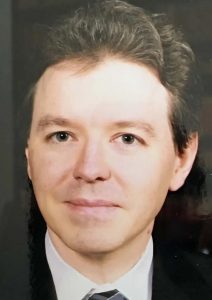The Texas law banning abortions about six weeks after the onset of a pregnancy should not be used to stop medically necessary abortions, according to an author of the controversial legislation known as Senate Bill 8.
“The statute was never intended to restrict access to medically necessary abortions, and the statute specifically says that it’s not restricting access to medically necessary abortions, so that shouldn’t be happening,” said Jonathan Mitchell, a lawyer and former Texas solicitor general, who lives in Austin, Texas. “The statute was written to draw a clear distinction between abortions that are medically necessary and abortions that are purely elective. Only the purely elective abortions are unlawful.”

Jonathan Mitchell
However much that was the intent of Mitchell and others behind Senate Bill 8, also known as the Texas Heartbeat Act, it is not the reality. Access to abortion in Texas narrowed to near zero after the U.S. Supreme Court let the law stand in September 2021 — a full year before the high court reversed Roe v. Wade.
Since adoption of the strict Texas law — which became a model for similar legislation in other states — women have been coming forward to tell stories of the personal dangers they faced because physicians were too afraid of prosecution to terminate a pregnancy, even when the mother faced dire medical repercussions or when they knew the fetus would not survive.
In short, the fear of facing even unfounded criminal charges has caused Texas physicians, hospitals and clinics to avoid most all pregnancy terminations, including those potentially allowed under the new law.
The term “medical emergency” is not defined.
Senate Bill 8 requires a physician to test for a “fetal heartbeat” before performing an abortion and prohibits an abortion if a “fetal heartbeat” is detected. An exception is allowed when “a physician believes a medical emergency exists that prevents compliance.”
However, the term “medical emergency” is not defined.
A unique feature of the Texas law is its provision not for state enforcement but for individual citizen enforcement. The law deputizes any citizen to sue anyone who performs or facilitates an illegal abortion.
“The impact of SB-8 and other laws has been to shut down virtually all abortions in Texas. Doctors say the laws are too vague and they fear lawsuits or prosecution,” said Sarah McCammon, host of NPR’s “All Things Considered,” where Mitchell’s legal work was profiled May 7.
“I do have a hard time understanding why SB-8 would’ve stopped medically necessary abortions because the statute specifically allows them at any point in the pregnancy and it specifically exempts those abortions from any type of liability, civil or criminal,” Mitchell said in the interview.
McCammon introduced listeners to Anna Zargarian, a Texas woman denied an abortion during a medical emergency.
“I begged my doctors to give me the care I needed. They said they wanted to help but couldn’t under Texas law. Where else in medicine do we do nothing and just wait and see how sick a patient becomes before acting?” Zargarian said in previous testimony played on the NPR news segment.
McCammon then asked Mitchell how this could be. That’s when he responded that the law clearly allows for medical emergencies. Yet as McCammon pointed out, he wrote the law with no definition of that term.
Critics of the Texas bill — which paved the way for the Supreme Court’s ruling in June 2022 that overturned Roe v. Wade — allege that vaguery is the abiding theme of Senate Bill 8, which was written in such a novel way as to defy court challenges before they happen.
That’s the work of Mitchell, who by his own description advises legislators “on how to draft their statutes in a way that will make them not only effective, but also able to withstand a court challenge if one arises.”
Amy Huster Miller, who used to run abortion clinics in Texas, told NPR Mitchell is “kind of a technical magician. My experience with him is that he has a very driven strategy to ban abortion by any means necessary.”
“Mitchell has become an expert at finding tiny openings in the law and leveraging them on behalf of his clients and their causes.”
McCammon explained: “Mitchell has become an expert at finding tiny openings in the law and leveraging them on behalf of his clients and their causes.”
The New York Times said Mitchell “represents a new iteration of the anti-abortion campaign. Instead of focusing on stacking the courts with anti-abortion judges, trying to change public opinion or pass largely symbolic bills in state legislatures, Mr. Mitchell has spent the last seven years honing a largely below-the-radar strategy of writing laws deliberately devised to make it much more difficult for the judicial system — particularly the Supreme Court — to thwart them, according to interviews.”
Pressed by McCammon of NPR to speak about his own views of abortion or his religious faith, Mitchell changed the subject.
The New York Times described him as the oldest of seven brothers, “raised in a religious Christian home in Pennsylvania.” He attended Wheaton College, an evangelical school in Illinois. The Times said, “Friends refrain from calling him on Sundays, as they know he spends at least several hours at church.”
What that church is, and what his religious beliefs are, remained unknown publicly.
His work for religious and politically conservative causes is becoming better known, however.
One of his other controversial cases, still working its way through an appeals court, is Braidwood Management Inc. v. Xavier Becerra et al. Mitchell represents clients who want to limit access to the drugs Descovy and Truvada — medications that help prevent HIV transmission when taken as PrEP, or pre-exposure prophylaxis. The suit claims open access to these medications “enables homosexual behavior.”
The case is so controversial that a judge allowed the very name of the case to be changed because Mitchell said one of the plaintiffs was being harassed over his position.
Related articles:
On abortion and guns: How is that American Christians can come to such different understandings of our faith? | Opinion by Amanda Hambrick Ashcraft


